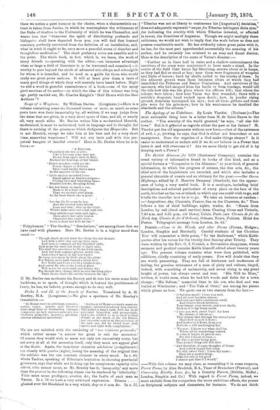Songs of a Wayfarer. By William Davies. (Longmans.)—Here is a
volume containing some six thousand verses or more, as much as some poets have won their immortality by, all written, if we may judge from the dates that aro given, in a very short space of time, and all, or nearly all, very much alike. Mr. Davies writes like a modernized Herrick, modernized, it must be understood, both in language and in thought, for there is nothing of the grossness which disfigures the .Hesperides. But is not Herrick, except vre take him at his best and for a very short time, somewhat wearisome ? Will not any taste pall with this per- petual banquet of fanciful sweets ? Hero is Mr. Davies when he is in f orce
" A REQUIEM.
"Peacefully she lies at rest ; Like a blossom some may say, Blown from apple trees in May; Hushed the heavings of her breast.
"Fairer wonders could not be : Pearly shapes so delicate, They could hardly find a mate In the marvels of the sea.
" Little minion-mouthed loves Stand aghast at Death's eclipse— Closing eyes and blanching lips— Blunted arrows, drooping doves.
"See her hand, so small a one, Made to fit a finer clasp Than we mortals ever grasp, In the laud where she is gone: "Let the lily blossom by her, And the bonded roses bloom Lean and wan ; shut up the tomb, Winter rains must not come nigh her. "Stay awhile your tears and sighs ; Then above her sable hearse Character this single verse: ' Love is dead and here he lies."
"Polyphemus," " The Garden," "Resolutions," are among those that we have read with pleasure. Here Mr. Davies is in a higher mood than usual :—
" Though death should draw thee from this fair domain And with a little clay seal up thine eyes.
And turn to common air thy breathed sighs, And make thy tears but drops of April rain; Yet shall thy sweetness be blown forth again, And, fed with summer glories, newly rise, And echoed music of thy lost replies Be sung once more by birds about the plain; For Beauty user bath limed a fairer face, Nor Truth and Love e'er lit a brighter eye; And surely He who is the Lord of grace Will never let such truth and beauty die; But though they change their mortal dwelling-place Their shows shall still survive beneath the sky."
If Mr. Davies can moderate his fluency and fit into his verse some little backbone, so to speak, of thought which is beyond the prettinosses of fancy, he has, we believe, powers enough to do very well.


































 Previous page
Previous page